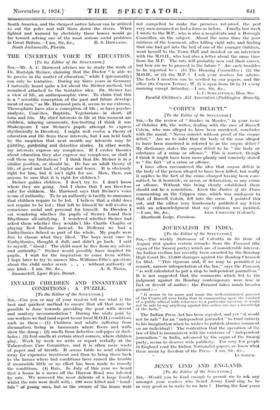THE UNCERTAIN VOICE IN EDUCATION.
[To the Editor of the SPECTATOR.] SIR,—Mr. A. C. Harwood advises me to study the work of Dr. Rudolph Steiner, claiming that the Doctor " is able to be precise in the matter of education," while I (presumably) can only be tentative. During my three years in Germany I naturally heard quite a lot about the Steiner method, but remained attached to the tentative idea. Dr. Steiner has a view of life, an anthroposophic view. To claim that this is a " scientific conception of the past and future develop- ment of men," as Mr. Harwood puts it, seems to me extreme. Theosophists have also a conception of life ; so have psycho- analysts, Coue-ites, Baptists, Vegetarians—in short, all isms and ists. My chief interests in life at this moment are children, inlaying ornaments, fox-trotting (I think it was Shakespeare I saw Steiner's pupils attempt to express rhythmically in Dresden). I might well evolve a theory of education and life from these interests, but I am held back by the suspicion that next month my interests may be painting, gardening and detective stories. In other words,
my interests express my complexes. If I evolve theories about education they also express my complexes, or shall I call them my limitations ? I think that Dr. Steiner is in a similar position, or should be. He has an adult theory of life, of good and bad, of higher and lower. It is obviously right for him, but it isn't right for me. How, then, can anyone be sure that it is right for children ?
Steiner guides children. I don't try to. I don't know where they are going. And I claim that I am therefore safer for children. Mr. Harwood says that Steiner's voice is one of authority. To be an authority is tacitly to announce that children require to be led. I believe that a child does not require to be led ; that left to himself he will evolve a conscience social and personal for himself. In Dresden I sat wondering whether the pupils of Steiner found their Rhythmus all-satisfying. I wondered whether Steiner had asked them whether they wouldn't like Charlie Chaplin or playing Red Indians instead. In Hellerau we had a Eurhythmics School as part of the whole. My pupils were tree to choose what they liked. The boys went once to Eurhythmies, thought it dull, and didn't go back. I said to myself, " Good ! The child must be free from my advice and authority." Steiner would possibly have inspired his pupils. I wait for the inspiration to come from within. I hope later to try to answer Mrs. Williams-Ellis's questions about the child under seven . . . without authority of










































 Previous page
Previous page